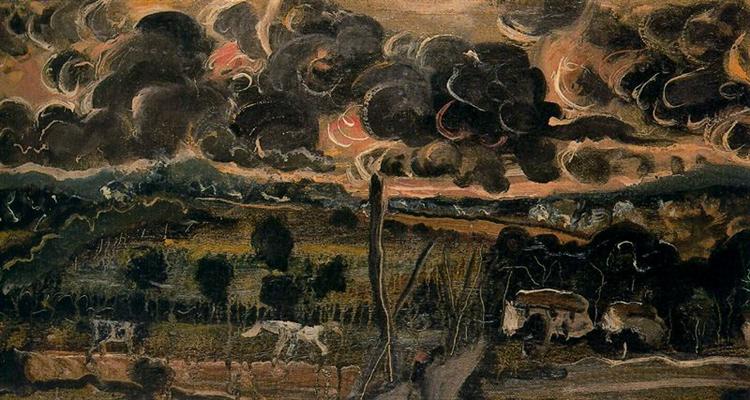Description
In the "sinister landscape" painting of 1950, André Derain displays a work that invites a deep reflection on the human condition against nature and the passage of time. This painting, which is part of the legacy of Fauvism, reveals the mastery of Derain in colorful use and in the representation of spaces, although in this case, with a particular emotional burden that moves away the work of its traditional exuberance.
The composition of the painting focuses on a steep landscape that evokes a feeling of restlessness. The forms on the canvas are robust, almost threatening. The choice of colors, dark and at the same time vibrant, contrasts with the cheerful lyric of Derain's early Fauvism. The palette is dominated by brown, green and gray tones, which accentuate the disturbing landscape atmosphere. However, the most alive touches that can be found in some elements of the background suggest a constant game between danger and beauty. This chromatic choice, far from being casual, seems to reflect the emotional state of the artist himself and a comment on the imminent decline he feels towards the world of his time.
In "Sinister landscape", Derain presents heavy skies, full of threatening clouds, which seem to reflect an internal conflict and existential anguish. The presence of twisted trees, perhaps, symbolizes not only the struggle of nature against adverse forces, but also an image of the human being facing internal and external threats. The absence of human figures is remarkable, which enhances the loneliness of the landscape and allows the viewer to project their own concerns and reflections on life and destiny in an adverse environment.
André Derain, one of the pioneers of Fauvismo with Henri Matisse, experienced throughout his career with color contrasts and light, but in "sinister landscape", this stylistic research is intimately intertwined with a more gloomy and reflective approach . This work is part of a period of his career that moves away from the celebration of life and enters a darker exploration of reality. Compared to other works of its production, such as "the dance" or "the beach of 1905", this painting reveals an evolution in its artistic vision, where the sinister and the disturbing take center stage.
In the context of modern art, "sinister landscape" can be seen as a precursor of subsequent movements that focus on the landscape as a mirror of the human psyche, where nature reflects more than simple beauties, but also fears, anguish and conflicts . His style, although clearly influenced by his formation in Fauvism, reflects the complexity of the world that Derain observed after World War II, a world where the vibrant color has been attenuated by the reality of disappointment.
Through this work, André Derain captures not only a physical landscape, but an emotional landscape loaded with meaning. "Sinister landscape" is ultimately a dialogue with El Espectador, an invitation to look beyond the obvious and explore the depths of what is presented. In its disturbing atmosphere and in its intense color choices, painting becomes a testimony of trauma and beauty that coexist in human experience.
KUADROS ©, a famous paint on your wall.
Reproductions of paintings handmade oil, with the quality of professional artists and the distinctive seal of KUADROS ©.
Art reproduction service with satisfaction guarantee. If you are not completely satisfied with the replica of your painting, we refund your money 100%.

